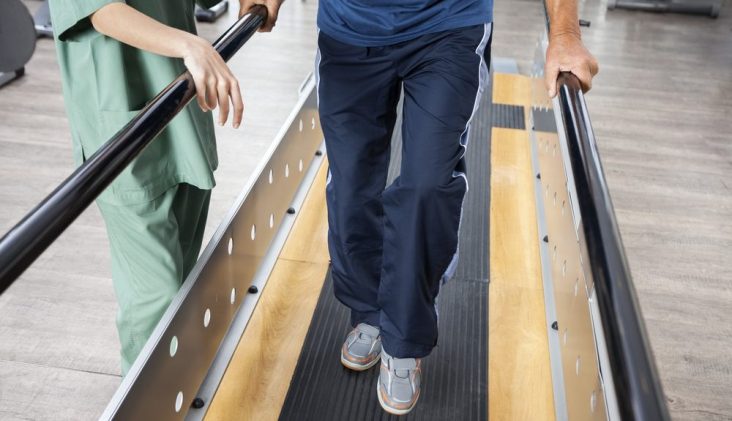Our client, Gerald, sustained life-changing injuries in a serious accident at work. Stewarts helped Gerald secure a settlement of £2.3m that will be used to provide ongoing rehabilitation and support, pay for a bungalow and enable him to pursue activities that remain crucial to his identity and well-being. Personal injury partner Warren Maxwell and paralegal Alicia Pursnani review Gerald’s case.
At the time of the incident, Gerald was 56 years old, lived with his wife and was employed full-time by the defendant as an HGV driver. His passions lay in his spiritual practices, including Tai Chi and Reiki, as well as his love for reading, travelling, and spending time with his grandson.
The accident
In October 2020, Gerald was delivering pallets on a flatbed trailer to a work site. After the pallets were unloaded, he climbed onto the flatbed trailer to re-sheet the remaining load of steel using shrink-wrap plastic meant for wrapping pallets. As he attempted to re-sheet the load, he lost his footing in the face of gusting winds and fell from the trailer to the ground.
Gerald’s case was that the shrink-wrap plastic was wholly unsuitable for sheeting. Had he been provided with proper equipment, such as tarpaulin, he would have sheeted the load from the ground, and the accident would not have happened.
The accident left Gerald with a range of traumatic injuries, including a skull fracture and traumatic brain injury (TBI), as well as fractures to his vertebrae, clavicle and ribs. These injuries significantly impacted his physical and cognitive abilities.
Impact of the injury
The brain injury Gerald sustained in the accident has had profound effects on his cognitive and emotional well-being. He struggles with assimilating and retaining information, reading, processing data and maintaining attention. He experiences severe fatigue and requires prompting to carry out daily tasks.
Emotionally, Gerald lost his confidence, experienced low mood and anxiety, and even found it overwhelming to leave his home. He lacks the empathy and social connections he once had, which has contributed to his isolation and led to a deterioration in his mental health.
Rehabilitation journey
Stewarts was able to access funds to meet Gerald’s rehabilitation and support needs during the course of the claim.
His rehabilitation has been extensive, with a multidisciplinary team (MDT) working on his recovery. His treatment involved neuropsychology, neuro-physiotherapy, musculoskeletal physiotherapy, occupational therapy and support from a rehabilitation assistant. Each specialist has addressed different aspects of his recovery, from cognitive rehabilitation to physical mobility, yet the journey has been challenging due to Gerald’s cognitive impairments and emotional difficulties.
His rehabilitation assistant has been instrumental in helping him manage his fatigue, plan activities and implement strategies recommended by his therapists. Despite the progress made in his physical therapy, Gerald continues to struggle with his cognitive functions and emotional regulation, requiring ongoing support and treatment.
Gerald’s rehabilitation journey has been highly complex, influenced not only by his cognitive impairments but also by significant emotional and executive function difficulties. While initially Gerald sought to return to practising Tai Chi, Reiki and martial arts, it became clear that his ability to engage in these activities had been severely impacted by his brain injury. Gerald is a deeply spiritual individual who loves reading and communing with nature. A major part of his rehabilitation has focused on restoring as much of this fulfilling lifestyle as possible.
Before the accident, Gerald and his wife enjoyed caravanning as a means of escape and relaxation. Gerald could no longer manage a caravan, so his claim included the costs of purchasing a lodge to act as a retreat, providing a vital space for relaxation and healing where the couple could enjoy peaceful time together.
The legal proceedings
The legal proceedings were complex. However, Stewarts and those working for the employer’s insurer worked collaboratively to progress the claim smoothly to minimise the parties’ costs and the stress on Gerald and his family.
In March 2024, a joint settlement meeting (JSM) was held to discuss a potential settlement. At the time, the defendant still alleged contributory negligence, arguing that Gerald should bear some of the blame for his fall. Gerald firmly rejected this, and it was agreed that Gerald would recover a total compensation sum of £2.3m.
This settlement provides Gerald with the financial means necessary to support his ongoing rehabilitation and future care needs, helping to secure his long-term well-being after the life-altering injuries he sustained in the accident.
Conclusion
Using a portion of the compensation awarded, WX has now purchased a home that suits his specific needs. The home has helped to improve his quality of life, reducing fatigue and cognitive stress, and providing him with a safe and comfortable environment for his ongoing rehabilitation. This home also allows him the peace and quiet he needs to manage his symptoms including the ability to retreat to avoid overstimulation when necessary.
Gerald’s brain injury has significantly altered his life and the lives of those close to him. The challenge has been not just in managing his cognitive and emotional impairments but also in preserving the aspects of his personality and lifestyle that defined him before the accident.
Stewarts’ team was led by partner Warren Maxwell, with Andrew Axon of Parklane Plowden acting as leading counsel.
Find out more
You can find further information regarding our expertise, experience and team on our Personal Injury page.



